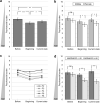Evolution of psychosocial burden and psychiatric symptoms in patients with psychiatric disorders during the Covid-19 pandemic
- PMID: 33942148
- PMCID: PMC8092366
- DOI: 10.1007/s00406-021-01268-6
Evolution of psychosocial burden and psychiatric symptoms in patients with psychiatric disorders during the Covid-19 pandemic
Abstract
The Covid-19 pandemic highly impacts mental health worldwide. Patients with psychiatric disorders are a vulnerable risk population for worsening of their condition and relapse of symptoms. This study investigates the pandemic-related course of psychosocial burden in patients with pre-existing mental disorders. With the newly developed Goettingen psychosocial Burden and Symptom Inventory (Goe-BSI) psychosocial burden has been traced retrospectively (1) before the pandemic (beginning of 2020), (2) at its beginning under maximum lockdown conditions (March 2020), and (3) for the current state after maximum lockdown conditions (April/May 2020). The Goe-BSI also integrates the Adjustment Disorder New Module (ADNM-20), assesses general psychiatric symptoms, and resilience. A total of 213 patients covering all major psychiatric disorders (ICD-10 F0-F9) were interviewed once in the time range from April, 24th until May 11th, 2020. Across all diagnoses patients exhibited a distinct pattern with an initial rise followed by a decline of psychosocial burden (p < 0.001, partial η2 = 0.09; Bonferroni-corrected pairwise comparisons between all three time-points: p < 0.05 to 0.001). Female gender and high ADNM-20 scores were identified as risk factors for higher levels and an unfavorable course of psychosocial burden over time. Most psychiatric symptoms remained unchanged. Trajectories of psychosocial burden vary in parallel to local lockdown restrictions and seem to reflect an adaptive stress response. For female patients with pre-existing mental disorders and patients with high-stress responses, timely and specific treatment should be scheduled. With the continuation of the pandemic, monitoring of long-term effects is of major importance, especially when long incubation times for the development of mental health issues are considered.
Keywords: Adjustment disorder; Coronavirus; Mental health; Psychosocial stress; SARS-CoV-2.
© 2021. The Author(s).
Conflict of interest statement
All authors report no financial relationships with commercial interests related to this article. Beyond that, CB receives honoraria as a diagnostic consultant for Boehringer Ingelheim. CWM advises Janssen Cilag and LivaNova on an honorary basis. He advises the following hospitals and the hospital company: Amelung Klinik, hospital company: Mecklenburg-Vorpommern, Berlin-Brandenburg, Niedersachsen. CWM completes seminars for: mibeg institutes, PKM. JW is supported by an Ilídio Pinho professorship, iBiMED (UIDB/04501/2020) at the University of Aveiro, Portugal. JW is an advisory board member of Abbott, Biogen, Boehringer Ingelheim, Immunogenetics, Lilly, MSD Sharp & Dohme, and Roche Pharma. JW received honoraria for lectures from the AGNP, Actelion, Amgen, Beeijing Yibai Science and Technology Ltd., CSF-Society, Helios Klinikum Wuppertal, Janssen Cilag, Med Update GmbH, Pfizer, Roche Pharma, Vitos Kurhessen-Bad Emstal, as well as funding from the German Federal Ministry for Education and Research (BMBF), the European Union (EU), and the German Research Foundation (DFG). JW holds the following patents: PCT/EP 2011 001724 and PCT/EP 2015 052945.
Figures


References
MeSH terms
LinkOut - more resources
Full Text Sources
Other Literature Sources
Medical
Miscellaneous

